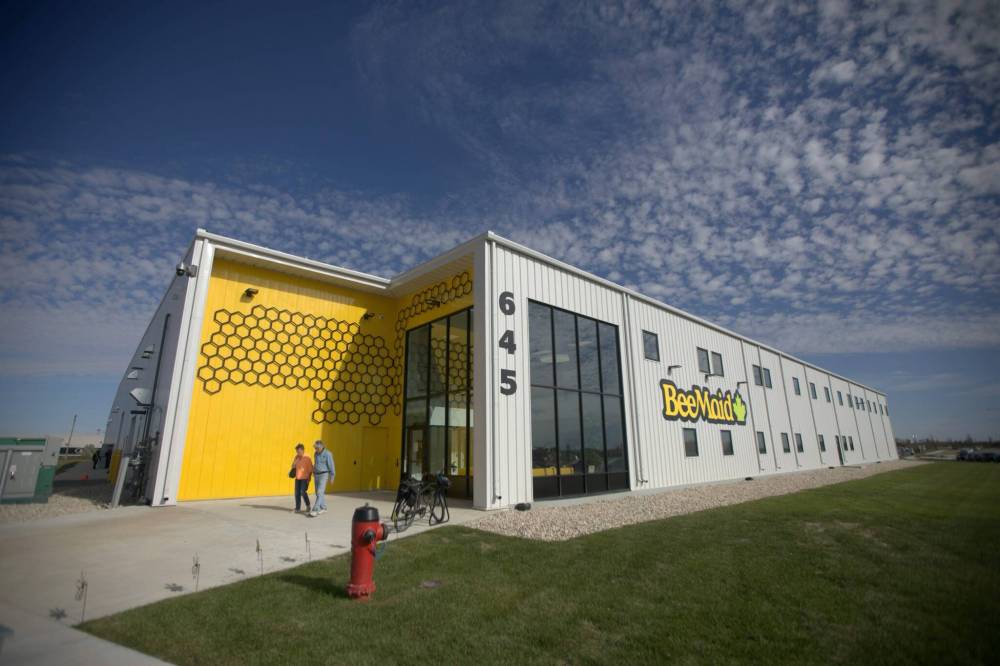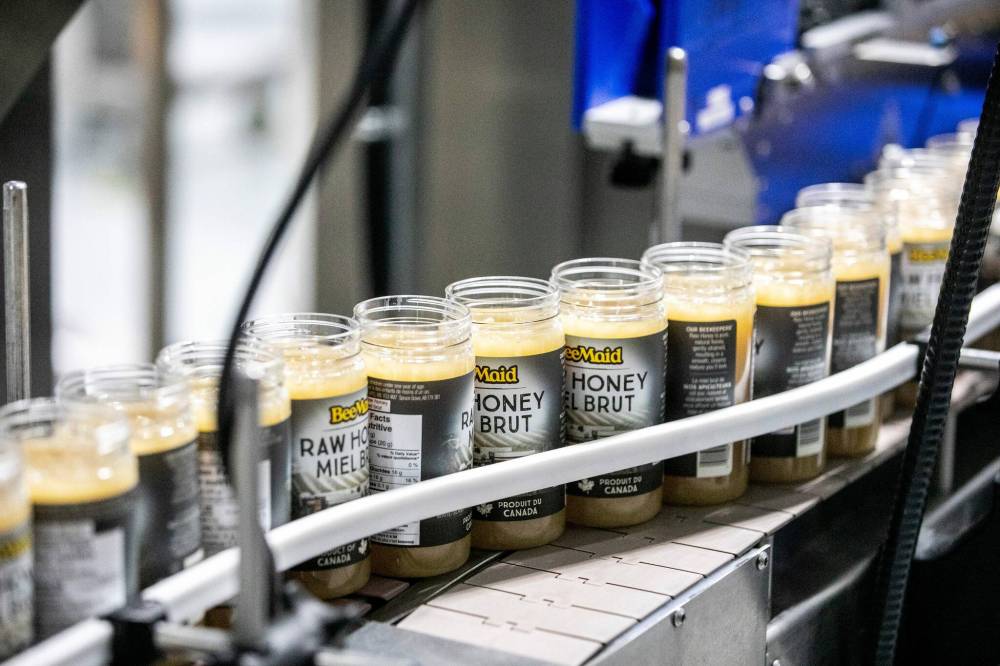
Workers buzzed inside Winnipeg’s newest food production hub: Bee Maid Honey Ltd.’s $25-million facility.
Beekeepers flitted under a banner welcoming visitors to the “hive” Tuesday, before donning smocks and hair nets for grand opening tours.
Kevin Voorhorst was among the producers exploring 645 Black Diamond Blvd. He viewed equipment capable of bottling 45 to 50 jars of honey per minute and rows of barrels ready for processing. Bee Maid intakes about 55,000 barrels per week.

MIKAELA MACKENZIE / FREE PRESS
Bee Maid Honey Ltd.’s new, $25-million facility at 645 Black Diamond Blvd.
Nearby, four tanks heated some 100,000 pounds (45,300 kilograms) of honey — a sharp increase from the roughly 60,000 lb. maximum at Bee Maid’s former location in Winnipeg.
The facility itself has nearly doubled the former plant, spanning 129,000 square feet (compared to 68,000 sq. ft. on Roseberry Street).
“(This) shows optimism,” Voorhorst remarked after the tour. “It shows a positive future for us.”
He and partner Laura Voorhorst began beekeeping seven years ago. They’re hoping to nearly double their production — to 600 hives from 350 — in the next year or two.
And at Bee Maid, there’s now room; growth is on the horizon, said chief operating officer Henry Klassen. “It’s about going out there and saying: ‘We do have the capacity to feed the export market.’”
In years prior, Bee Maid — which gets its honey from a co-operative of local beekeepers — was limited by space and had a facility in need of repair, officials said. Barrels of honey were kept in a rented storage facility and on producers’ farms, in addition to the Roseberry site.
Five years ago, co-operative members voted to erect a new facility. It came amid increasing demand for honey.
In Canada, more people have been substituting honey for sugar, Bee Maid chief executive Guy Chartier told the Free Press in February. There’s also been hunger from countries like Japan and South Korea.
He estimated Bee Maid intakes about 30 per cent of Canada’s honey between its Manitoba and Alberta plants.
Last year, the Prairie provinces produced 81 per cent of Canada’s honey, totaling 74 million lb., according to Statistics Canada. Manitoba exported 2,664 metric tonnes of honey.
“We have a lot of potential now to work through the growth plans that we have as an organization,” Klassen said.
Bee Maid hired another shift’s worth of staff — seven to eight people — to accommodate increased production. Now, roughly 40 employees work on the floor.

MIKAELA MACKENZIE / FREE PRESS
Jars of raw, creamed honey being filled on the production line, Tuesday.
There’s honey to be tested, jars to be weighed. Bee Maid is vertically integrated: it makes about 80 per cent of the jars it uses. It also packages honey for various labels.
Its Spruce Grove, Alta., plant is undergoing its own expansion to 141,000 sq. ft. from 56,000 sq. ft.
“It’s all about the future, looking ahead now,” Chartier said Tuesday.
Products marketed as honey coming from overseas, diluted by ingredients such as sugar syrup, continue to be a disturbance to the industry, Voorhorst noted.
The imported honey, which makes up a minority of Canada’s product, is sometimes sold for cheaper than production cost in Canada, he added.
“We’re proud to ship to Bee Maid because we know it’s 100 per cent local,” Voorhorst said. “There’s no adulteration, there’s no funny business.”
Bee Maid began packing its honey on Black Diamond Boulevard in May.

Gabrielle Piché
Reporter
Gabrielle Piché reports on business for the Free Press. She interned at the Free Press and worked for its sister outlet, Canstar Community News, before entering the business beat in 2021. Read more about Gabrielle.
Every piece of reporting Gabrielle produces is reviewed by an editing team before it is posted online or published in print — part of the Free Press‘s tradition, since 1872, of producing reliable independent journalism. Read more about Free Press’s history and mandate, and learn how our newsroom operates.
Our newsroom depends on a growing audience of readers to power our journalism. If you are not a paid reader, please consider becoming a subscriber.
Our newsroom depends on its audience of readers to power our journalism. Thank you for your support.


